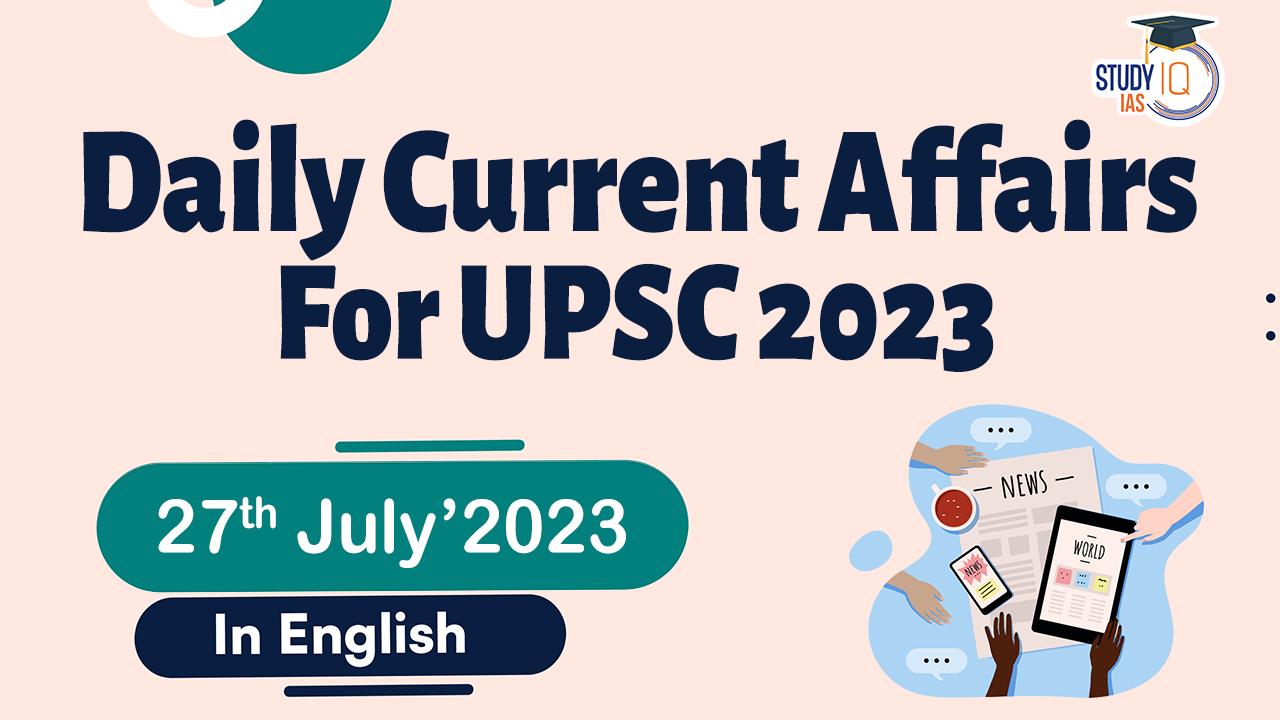Daily Current Affairs for UPSC 2023
Q) Recently seen in news, the ‘Global Education Monitoring Report’ was released by which one of the following organizations?
- Heritage Foundation
- World Economic Forum
- United Nations Development Program
- United Nations Educational, Scientific and Cultural Organization
Daily Current Affairs for UPSC – 26 July April 2023
Explanation:
- Option (4) is correct: The UNESCO has warned against the use of digital products in educational settings in its latest publication titled ‘Global Education Monitoring Report -Technology in education: a tool on whose terms?’ As per the Report digital technology has dramatically increased access to teaching and learning resources. Examples include digital libraries, educational portals, and open educational resources. The report cited the examples of National Academic Digital Library of Ethiopia and National Digital Library of India. Some education technology has shown small to medium-sized positive effects on certain types of learning. In China, high-quality lesson recordings delivered to 100 million rural students improved student outcomes by 32% and reduced urban–rural earning gaps by 38%. Online learning became a lifeline during the COVID-19 school closures, offering a potential reach of over 1 billion students. It allowed students to continue their education remotely during times of crisis. Technology, such as radio and mobile phones, has been used to deliver education to hard-to-reach populations.
Q) Consider the following statements about Zero Hour:
- Members of Parliament can raise matters of urgent public importance during zero hour.
- It is mentioned in the Rules of Procedure of the House.
- The Ministers are bound to reply in the Zero Hour unlike Question Hour.
How many of the statements given above are correct?
- Only one
- Only two
- All three
- None
Explanation:
- Statement 1 is correct: Zero Hour is the time when Members of Legislatures can raise Issues of Urgent Public Importance. It starts immediately after the question hour and lasts until the agenda for the day (i.e., regular business of the House) is taken up. In other words, the time gap between the question hour and the agenda is known as zero hour.
- Statement 2 is incorrect: Zero Hour is not mentioned in the Rules of Procedure. Thus, it is an informal device available to MPs to raise matters without any notice 10 days in advance. Zero Hour is an Indian parliamentary innovation. The concept of Zero Hour started organically in the first decade of Indian Parliament, when MPs felt the need for raising important constituency and national issues.
- Statement 3 is incorrect: The first hour of every sitting during a Parliament Session is called the Question Hour. The difference between Zero Hour and Question Hour is the Ministers are not bound to reply in the Zero Hour. For raising matters during the Zero Hour, MPs must give the notice before 10 am to the Speaker/Chairman on the day of the sitting. The notice must state the subject they wish to raise in the House. However, Speaker, Lok Sabha/Chairman, Rajya Sabha may allow or decline a Member to raise a matter of importance.
Q) With reference to Financial Action Task Force (FATF), consider the following statements:
- India is a founding member of FATF.
- The FATF develops standards to combat money laundering.
- The FATF’s grey list includes non-cooperative nations as they encourage the financing of terrorism.
How many of the statements given above are not correct?
- Only one
- Only two
- All three
- None
Explanation:
- Statement 1 is incorrect but statement 2 is correct: Financial Action Task Force (FATF) is an inter-governmental body that has developed standards to prevent and combat money laundering and terror financing. It was established in 1989 during the G7 Summit in Paris to develop policies against money laundering. FATF aims to establish international standards, and to develop and promote policies, both at national and international levels, to combat money laundering and the financing of terrorism. In 2001 its mandate expanded to include terrorism financing. FATF members include 37 countries, including the United States, India, China, Saudi Arabia, UK, Germany, and France. India became a member of FATF in 2010.
- Statement 3 is incorrect: Countries known as Non-Cooperative Countries or Territories (NCCTs) are put on the blacklist, not grey list. These countries support terror funding and money laundering activities. The FATF revises the blacklist regularly, adding or deleting entries. Three countries North Korea, Iran, and Myanmar are currently in FATF’s blacklist. Countries that are considered a safe haven for supporting terror funding and money laundering are put on the FATF grey list. This inclusion serves as a warning to the country that it may enter the blacklist.
Q) Consider the following statements:
- Statement-1: Fast radio bursts are extremely short-lived waves produced by unidentified sources in the deep space.
- Statement-2: Fast radio bursts emit gamma-ray radiation through its course.
Which one of the following is correct in respect of the above statements?
- Both Statement-1 and Statement-2 are correct and Statement-2 is the correct explanation for Statement-1
- Both Statement-1 and Statement-2 are correct and Statement-2 is not the correct explanation for Statemeht-1
- Statement-1 is correct but Statement-2 is incorrect
- Statement-1 is incorrect but Statement-2 is correct
Explanation:
- Option (3) is correct: Fast radio bursts (FRBs) are super intense, millisecond-long bursts of radio waves produced by unidentified sources in the deep space. Their discovery in 2007 by American astronomer Duncan Lorimer led to the term ‘Lorimer Bursts’. Since then, just a few dozen similar events have been observed in data collected by radio telescopes around the world. Recent research suggested that some FRBs originate from magnetars, which are neutron stars with extremely powerful magnetic fields. FRBs are extremely short-lived, typically lasting only a few milliseconds. Unlike gamma-ray bursts (GRBs), which emit gamma-ray radiation, FRBs are characterized by their emission of radio waves in the electromagnetic spectrum. FRBs are incredibly bright, with a luminosity equivalent to hundreds of millions of times the output of our Sun. It is one of the defining features of FRBs. As radio waves travel through space, they encounter free electrons that cause them to disperse or spread out.
Q) With reference to Zero-budget natural farming (ZBNF), consider the following statements:
- Artificial fertilizers and herbicides are eliminated in the process of ZBNF.
- ZBNF helps improve crop yields by as much as 20 percent.
Which of the statements given above is/are correct?
- 1 only
- 2 only
- Both 1 and 2
- Neither 1 nor 2
Explanation:
- Statement 1 and 2 are correct: Zero-budget natural farming (ZBNF) is a sustainable agricultural practice that aims to reduce the cost of cultivation, enhance soil fertility, enhance yields, reduce risks, and protect from uncertainties of climate change by promoting the adoption of an agro-ecology framework. ZBNF does not use synthetic fertilizers, pesticides, or herbicides. Instead, it relies on natural inputs such as compost, crop residues, and bio-fertilizers. Studies have shown that ZBNF can lead to increased crop yields of up to 20%. ZBNF helps to improve soil health by increasing the levels of organic matter and nutrients in the soil. ZBNF can help to reduce input costs by eliminating the need for synthetic fertilizers, pesticides, and herbicides. ZBNF can help to increase the resilience of crops to climate change by improving soil health and water retention.


 Earthquake in Myanmar, Causes, Impact an...
Earthquake in Myanmar, Causes, Impact an...
 India’s Deep Sea Technology, Need and ...
India’s Deep Sea Technology, Need and ...
 Daily Quiz 29 March 2025
Daily Quiz 29 March 2025





















